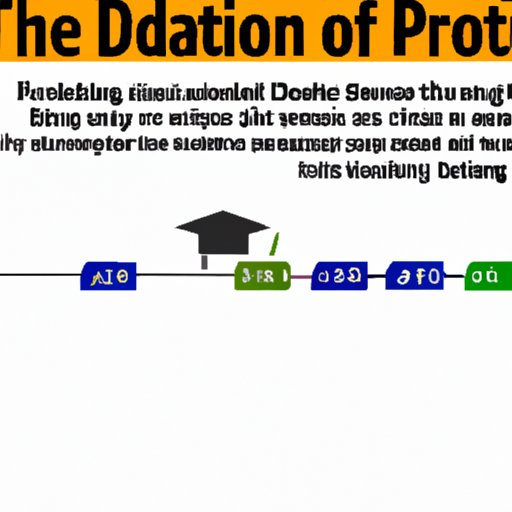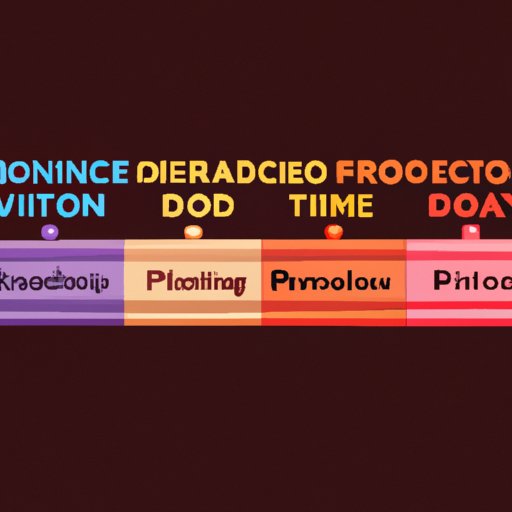Introduction
A PhD is an advanced degree that requires a significant commitment of time and energy. It is often the highest level of academic accomplishment and can open up many opportunities for those who successfully complete the program. Understanding the timeline for obtaining a PhD and the dedication it requires can help people decide if pursuing this degree is the right choice for them.

Overview of the Length of Time it Takes to Earn a PhD
The length of time it takes to earn a PhD depends on several factors, including the type of program, the field of study, and the individual’s academic background. According to the National Science Foundation, the average amount of time to complete a PhD program is 5.8 years. However, this timeline can vary significantly depending on the individual and their particular situation.
Reasons Why People Pursue a PhD
There are many reasons why individuals may choose to pursue a PhD. According to research conducted by the Council of Graduate Schools, the most common reasons for earning a PhD include: career advancement, increased job satisfaction, personal growth, and intellectual challenge. A PhD can also provide access to higher salaries and more job opportunities.

The Timeline for Obtaining a PhD
The timeline for obtaining a PhD varies depending on the individual and the program they are enrolled in. Generally, there are four major steps in the process: coursework, comprehensive exams, dissertation research, and defense. Each step typically takes different amounts of time.
Steps in the Process
The first step in the process is completing coursework. Depending on the program and the student’s prior academic experience, this typically takes between two and three years. After completing coursework, students must pass comprehensive exams, which are designed to test their knowledge of the subject matter. This step usually takes about six months.
The third step in the process is dissertation research, which involves conducting research, collecting data, and writing the dissertation. This step typically takes the longest amount of time, usually between one and two years.
The final step is defending the dissertation, which is an oral examination of the student’s research. This usually takes about one to two months.
Typical Length of Time for Each Step
In total, the typical length of time it takes to complete a PhD program is between four and seven years. However, this timeline can vary greatly depending on the individual and their particular circumstances. For example, some students may take longer to complete the coursework or dissertation research than others.
How Long Does it Take to Get a PhD and What is Involved?
Earning a PhD is a significant commitment of time and effort. It is important for prospective students to understand the timeline for obtaining a PhD and the dedication required to successfully complete the program. There are many advantages to earning a PhD, but it is important to consider both the pros and cons before making a decision.
Understanding the Commitment Required
Earning a PhD requires a great deal of dedication and hard work. It is important to understand the timeline for completing the program and the commitment required to successfully finish. Additionally, students should be aware of the financial costs associated with pursuing a PhD, as well as any other potential challenges they may face.
Examining the Pros and Cons
It is important to consider both the benefits and drawbacks of earning a PhD before making a decision. For example, a PhD can provide access to higher salaries, greater job opportunities, and increased job satisfaction. On the other hand, it is a long and challenging process that requires a significant commitment of time and energy.
What You Need to Know About Finishing a PhD Program
In order to successfully complete a PhD program, students must meet all of the requirements set forth by the program. This includes completing coursework, passing comprehensive exams, conducting dissertation research, and defending the dissertation. Additionally, students should be aware of any additional requirements and expectations set by the program.
Conclusion
Earning a PhD is a significant commitment of time and effort. The typical length of time it takes to complete a PhD program is between four and seven years, although this timeline can vary greatly depending on the individual and their particular circumstances. It is important to understand the timeline and commitment required to successfully complete a PhD program, as well as the potential benefits and drawbacks of pursuing this degree.
(Note: Is this article not meeting your expectations? Do you have knowledge or insights to share? Unlock new opportunities and expand your reach by joining our authors team. Click Registration to join us and share your expertise with our readers.)
